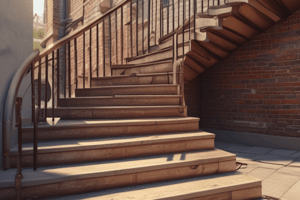Podcast
Questions and Answers
What is the historical origin of treads according to the text?
What is the historical origin of treads according to the text?
- Prehistoric times when ancestors crafted platforms for climbing steep slopes. (correct)
- Medieval Europe where treads were used in agriculture.
- Ancient Mesopotamia where treads were first invented.
- Roman Empire where treads became popular in footwear.
Which ancient ladder is mentioned in the text as one of the earliest examples of treads?
Which ancient ladder is mentioned in the text as one of the earliest examples of treads?
- Wattle-and-daub ladder (correct)
- Metal ladder
- Stone ladder
- Rope ladder
In what way do treads in footwear help individuals according to the text?
In what way do treads in footwear help individuals according to the text?
- Enhancing visibility
- Reducing shoe weight
- Improving grip and traction underfoot (correct)
- Increasing shoe size
How have treads evolved over centuries?
How have treads evolved over centuries?
What is the main purpose of tread patterns on the soles of shoes?
What is the main purpose of tread patterns on the soles of shoes?
Where did workers use wattle-and-daub ladders according to the text?
Where did workers use wattle-and-daub ladders according to the text?
What is the primary function of treads on car tires?
What is the primary function of treads on car tires?
Which type of tread patterns are suitable for off-road driving and muddy trails?
Which type of tread patterns are suitable for off-road driving and muddy trails?
What materials are commonly used to create treads in various applications?
What materials are commonly used to create treads in various applications?
Which manufacturing process is NOT mentioned in relation to creating treads?
Which manufacturing process is NOT mentioned in relation to creating treads?
What innovative feature can smart treads provide for vehicles?
What innovative feature can smart treads provide for vehicles?
How do self-cleaning treads contribute to vehicle safety and longevity?
How do self-cleaning treads contribute to vehicle safety and longevity?
Flashcards are hidden until you start studying
Study Notes
Unraveling Tread: Understanding Treads in Everyday Life
Treads are a common feature in our daily experience, yet they often go unnoticed—the humble under-footing that supports our movements and helps us navigate through various terrains. Let's explore the fascinating world of treads, from their historical roots and fundamental concepts to their applications in daily life.
Treads: A Historical Perspective
The origins of treads can be traced back to prehistoric times when our ancestors crafted crude platforms for their feet to climb up steep slopes and descend them safely. Over centuries, treads have evolved, becoming more sophisticated and adaptable to serve various applications.
One of the earliest examples of treads is the wattle-and-daub ladder, which dates back to ancient Egypt and Mesopotamia. These ladders featured simple wooden rungs that allowed workers to reach elevated areas for construction, maintenance, and even agriculture.
Treads in Modern Life
Today, treads are ubiquitous, and we encounter them in various daily contexts.
-
Footwear: Treads are built into our shoes and boots to improve grip and traction underfoot, whether on smooth surfaces like polished floors, or on rugged terrains like mountain trails.
- Examples: The soles of hiking boots, running shoes, and dress shoes all feature tread patterns to enhance traction, durability, and comfort.
-
Vehicles: Treads on tires play a crucial role in maintaining contact with the ground, allowing vehicles to move forward, brake, and steer effectively.
- Examples: The treads on car tires are designed to disperse water, enhance grip, and promote even wear. Tires with tread patterns made for snow, mud, or off-roading vehicles are optimized for each specific surface.
-
Staircases: Treads on staircases provide a safe and comfortable surface for walking, climbing, and descending.
- Examples: Staircases in homes, offices, and public buildings typically feature wooden treads, with a non-slip texture for safety.
Fundamentals of Tread Design
Tread design is a complex field, balancing several factors to ensure optimal performance and safety.
-
Geometry: The shape and size of tread patterns are crucial to the overall performance of footwear, vehicles, and staircases.
- Examples: Aggressive tread patterns are suitable for off-road driving, muddy trails, or snowy roads, while a smoother, more uniform pattern is ideal for polished floors, smooth surfaces, or in-town driving.
-
Materials: The choice of materials used in tread design can significantly impact performance and durability.
- Examples: Natural materials like wood, rubber, and leather are commonly used to create treads. Synthetic materials, such as polyurethane, are also employed to achieve specific performance characteristics and lower costs.
-
Manufacturing processes: The methods used to manufacture treads can influence the quality, durability, and overall performance of the product.
- Examples: 3D printing, injection molding, and CNC machining are some of the manufacturing processes used to create treads and other components.
Advanced Tread Applications
Innovative tread designs are emerging across various industries, introducing new possibilities and applications.
-
Smart treads: Intelligent treads can adapt to changing conditions, such as wet or icy surfaces, to enhance grip and safety.
- Examples: Smart treads can be manufactured using materials that change their form and texture in response to environmental factors.
-
Self-cleaning treads: Treads with self-cleaning properties can help prevent the buildup of dirt, mud, or debris, increasing safety and longevity.
- Examples: Self-cleaning treads are typically made with textured or ribbed patterns that allow for easy shedding of debris and water or oils.
-
Eco-friendly treads: Environmentally friendly treads are designed with sustainability in mind, reducing waste and promoting the use of renewable materials.
- Examples: Eco-friendly tread patterns can be made using natural rubber, recycled materials, or biodegradable substances.
Conclusion
From our ancestors' earliest attempts to navigate challenging terrains to the cutting-edge technology of today, treads have played an essential role in our lives. Understanding the fundamental concepts and applications of treads can help us better appreciate their importance and influence in shaping our daily experiences. "History of Ladders." Encyclopedia Britannica, https://www.britannica.com/topic/ladder/History "Tread Design and Materials Selection for Tires." Tire Technology International, https://tiretechnologyonline.com/tread-design-and-materials-selection-for-tires/ "Smart Treads: The Future of Road Safety." Smart Cities World, https://smartcitiesworld.net/smart-treads-the-future-of-road-safety/ "Self-Cleaning Treads: The Future of Footwear." Runner's World, https://www.runnersworld.com/gear/a20939028/self-cleaning-treads/ "Eco-Friendly Treads: The Sustainable Future of Tires." Sustainable Brands, https://www.sustainablebrands.com/news_and_views/supply_chain_materials_sourcing/eco-friendly-treads-the-sustainable-future-tires
Studying That Suits You
Use AI to generate personalized quizzes and flashcards to suit your learning preferences.




